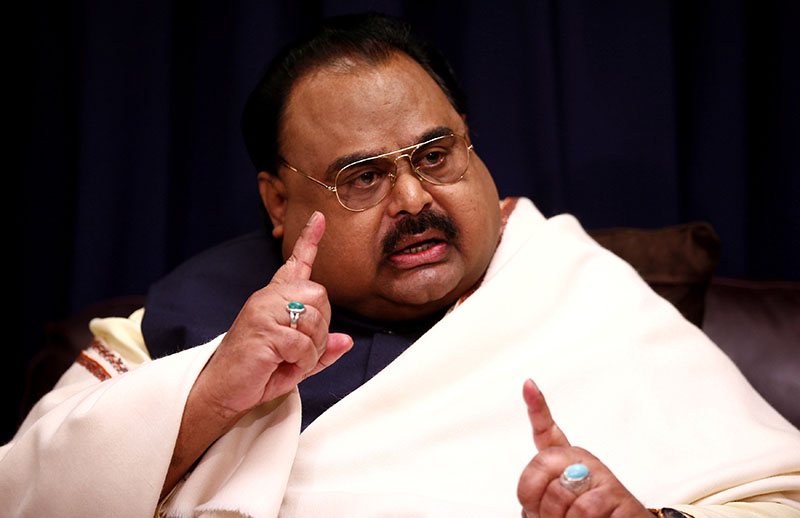Exiled politician tells his Pakistan party he is still boss
LONDON: His grip on the powerful Pakistani party he has run for decades under threat, maverick politician Altaf Hussain said from self-imposed exile that he was still in charge and foes within his party would be rejected by voters in a 2018 general election.
The sweltering metropolis of Karachi is Pakistan's largest and wealthiest city, dominated since the 1980s by Hussain's Muttahida Qaumi Movement (MQM) party.
Any significant shift in the dynamics of who controls its teeming streets could have major repercussions for the economy, the military and the national government, whose grip on Karachi has been tenuous through years of Hussain dominance.
Hussain has ruled the port city with an iron fist despite living thousands of miles away in London, able to close businesses and bring streets to a standstill with a single order.
But that ability has ebbed since 2013, when the military launched a crackdown in which Altaf says hundreds of MQM members have been arrested and killed in extrajudicial operations.
Authorities deny the charge, saying they have targeted criminals and militants irrespective of political affiliations, and brought down crime rates considerably.
The Pakistani military did not answer requests for comment for this article.
Hussain's control over the party he founded in 1984 has also been undermined as loyalists led by former right-hand man Farooq Sattar announced in August the MQM would no longer be run from London but by politicians in Karachi.
"Nobody will vote for Farooq Sattar," Hussain told Reuters in a recent, rare interview at his north London office, adding that Sattar abandoned him at the behest of the powerful military.
"Farooq Sattar's party is the undeclared party of the establishment," he said, his distinctive shrill voice rising.
He added that he felt betrayed by his former colleagues.
"I have a lot of sorrow about this," Hussain said.
Sattar declined to comment on Hussain's remarks.
While Hussain has been known to criticise Pakistan's army in fiery speeches to party rallies delivered over the telephone via loudspeakers, one particular speech in August proved key.
Addressing workers on hunger strike over the suspected murder of their colleagues, Hussain incited supporters to storm the office of a television channel. The riots that followed left one person dead and several wounded.
Following the violence, many of Hussain's top lieutenants, including Sattar, were arrested by the paramilitary Rangers force, interrogated overnight and released.
The next day, Sattar and his allies pronounced the unthinkable: Hussain would no longer lead the party. It was seen as the first organised attempt in more than two decades to take him on from within.
"DOWN WITH PAKISTAN"
Hussain has a long record of survival.
For much of the 1990s, security forces in Karachi cracked down on the party much like they are now, pushing Hussain to seek asylum in the United Kingdom.
The party re-emerged stronger after that crackdown and has since enjoyed unquestioned support from "mohajirs", descendants of Urdu-speaking migrants from India who dominate Karachi and other urban centres of southern Sindh province.
But the party is also accused of exercising influence through gangs engaged in racketeering, kidnappings for ransom and targeted killings in Karachi. The party denies the charges.
The MQM has also been accused by the government and Karachi police of receiving support from India's Research and Analysis Wing (RAW), its main foreign intelligence agency, but the allegations have never been proven and the MQM has always denied them.
"We never ever had any relation with RAW up till now – up till now, remember this word, 'up till now'," Hussain said. "Tomorrow I cannot assure you that we'll not have a relation."
QUESTIONS OVER HEALTH
Hussain, 63, played down concerns over his health, amid media speculation in Pakistan that the strains within his party and a battery of legal challenges in Pakistan and abroad were taking their toll.
"Allah is merciful," he said, when asked about media reports that he suffered from severe diabetes, liver damage and heart disease.
A party worker quickly kneeled on the floor next to him, removed his shoe and gently peeled off his sock to reveal a small bandage on his foot.
Hussain joked that the media had spread rumours that his foot had to be amputated, although he had hurt it on a nail.
He admitted he had for years found it hard to sleep more than a few hours a night, as he thought about returning to Pakistan and building a "prosperous, very strong country where everybody can enjoy rights."
"I still love my country," Hussain said. "I want to save Pakistan."






